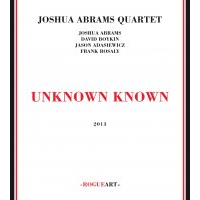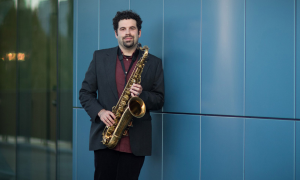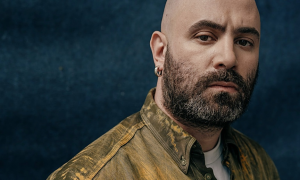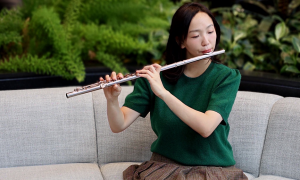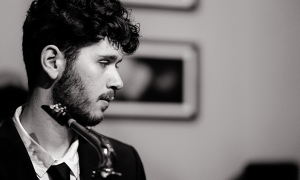Home » Jazz Articles » Take Five With... » Take Five With Ralph J DeLorso Jr.
Take Five With Ralph J DeLorso Jr.
I am a 59 year-old seasoned professional drummer. For 43 years I worked for WM Morris and Willard Alexander. For many years I have performed and recorded with many artists. I have performed with the late Jackie McLean two years before his passing at the Artist Collective in Hartford. I started playing drums at four, and at 12 I worked in a burlesque house with Ann Corio in Hartford. I snuck in with house drummer Harold Standard, where he taught me the art. I met Standard while shining shoes at Wooster Pool Hall in Hartford. Harold would get his shoes shined and send me to pick up his food while he shot a game of pool. One day he told me he was a drummer after seeing my drum sticks out my back pocket. This was a the beginning of a seven-year friendship.
Instrument(s):
Drums.
Teachers and/or influences?
First was Rich Smith, a teacher at Roger Wolcott Elementary School. Mr. and Mrs. Valerin were my tap dance instructors who taught dance at our school. Harold Standard was the pit drummer for Charlie's Steak and a burlesque club in Hartford where Ann Corio performed. Joe Rowland, Joe (Skinny) Porcaro at Lepaks Drum Shop, Al Cardello at Cardello's Drum Shop, Richie LaPore, Art Perretta, Tilly Lisbein, Bob Gatzen, Mickey Roker, Gary Chaffee, Mark Carter, Al LePak, and Ed Soph.
I knew I wanted to be a musician when...
I started when I was four years old with a pad and a snare drum. I played with the VFW Drum Corp learning rudiments and got my first kit at seven. From there I started taking lessons on the kit. I saw the Gene Krupa Story (1959) and got to watch Gene Krupa at the London Palladium when I was seven years old in 1960. I got my first jazz album, Miles Davis' Bag's Groove (Prestige, 1958), when I was eight. I was listening to Kenny Clarke and Buddy Rich, and knew I wanted to spend my life as a drummer. Everyone has their heroes who inspired them; mine was not Ringo Starr, mine were Gene Krupa, Cozy Cole, Buddy Rich and, later, Bobby Colomby, Billy Cobham and Sandy McKee. I was hooked on jazz, jazz-rock, soul, Motown, funk, Latin, and blues-rock. Despite my wide musical taste, jazz, funk, and R&B was my thing. I love to groove and lay a deep, fat, in the pocket, balls-to-the-wall groove.
Your sound and approach to music:
My sound is unique in it of itself. I tune my drum depending on the style of music I'm playing. I usually like a tight deep punchy sound for funk, but for jazz and bebop, a higher pitch for the toms and bass drum with a loose feel on the snare drum. I approach my music as I was once taught by Ed Thigpen when I took a few private lessons I was 13 years old. He told me to sit on his set and as I did he yelled at me saying "Get off my lady! You don't ever mount my lady as though you were jumping on a horse." He taught me a proper mindset of approaching my set. That introduction in it of itself was a life lesson I never forgot.
Your teaching approach:
I've developed my own teaching concept using old school methods with modern technology. My first lesson is teaching how students how to read. We cannot approach or work unless we share a language and that language is essential to being a drummer to communicate. I've heard all the arguments about how reading stifles your creativity and it is such bullshit. There are rare people who build extraordinary careers by not reading back in the day, but if you want to be a serious musician you must read. It's the language we share and it is a reference to repeat a performance if needed. Without it, I don't care how good your ears or memory are, you'll never replicate the same piece again without reading. There are exceptions, but in the real world you must read.
Your dream band:
For the rhythm section I'd love to have Gene Harris on piano, Jeff Beck or Ray Obeido on guitar, Jaco Pastorius or Charles Mingus playing bass, Jimmy Smith on organ, and Tito Puente with Giovanni Hidalgo on percussion. On horns, the Brecker Brothers, Fred Wesley, and Maceo Parker.
Road story: Your best or worst experience:
Performing with Richard "Groove" Holmes when I was 15 years old at Jerry Mack's in Hartford. Richard Holmes loved my playing and I played every gig at Jerry Mack's with him. After that I also played with Jimmy McGriff and Brother Jack McDuff.
Favorite venue:
In New York, with the Timmo Lassie Jazz Band. even though these cats were from Finland and English was a tough hurdle for them, we communicated and played fantastic performances, and they were gracious to let me have the flexibility to improvise and create as I wished. I kept my playing within the bar lines and they loved my performance. Later on, Randy Brecker and Sonny Rollins, who were both in the venue, came up and played with us—playing with the two of them was a dream come true for me.
Your favorite recording in your discography and why?
Well the list is quite long and I pick what I feel the grooves the most. As a drummer, I like challenging pieces to work on (with charts if possible otherwise I learn them by ear), but it has to swing or groove.
Even a ballad as to breathe and not crowd or clutter with over playing and the vocals must have dynamic phrasing. In fact, all my music must breathe and have dynamics with articulation. Some of my favorites are Olinga by Milt Jackson with Mickey Roker on drums, Cedar Walton on piano, and Ron Carter on bass. All the Cold Blood albums, Tower of Power, and the Buddy Rich Big Band. John Coltrane and Johnny Hartman is one of the best recordings ever. I also like stuff by Sarah Vaughan and Frank Sinatra. Man, there's just too many.
The first Jazz album I bought was:
Bag's Groove was the first record I bought.
What do you think is the most important thing you are contributing musically?
As drums go, I invented some pretty great things to help drummers and they are patented, but musically my diversification in the music keeps me grounded. I'm constantly exploring rhythms, sounds, tempos, and passing my knowledge to younger drummers. Recently, I was teaching a student and he had a couple of his friends over who played in his band and we ended up working on their songs list. Keep in mind that their music, heavy metal, is something I rarely care about, but I believe that I ended up getting more out of it than I thought. They learned a different approach to learning their songs and using dynamics to give the music more punch. They were astounded that the principles I applied worked better for them and their music.
Did you know...
I'm a 5th Degree Black Belt in Hapkido, 4th in Daito Ryu Aiki jujitsu, 2nd in judo, and 1st in Kyokyushinki, The benefit is beyond just learning to defend yourself, it's principles are life altering.
CDs you are listening to now:
José James, Nicola Conte, Melody Gardot, and Robert Glasper.
How would you describe the state of jazz today?
I keep hearing that jazz is dead, but on the contrary I think it is evolving, which it should be. I hear many new artists even rock singers attempting to sing standards. Rod Stewart, Paul McCartney, and Michael Bolton- these cats are destroying the beauty of these great standards, yet there are young artists who put their spin on them like Gregory Porter, José James, Steve Tyrell, and Jamie Cullum. There are groups who knock it out of the park like Snarky Puppy and Jazzinvaders. Jazz from Japan and Europe is outstanding while we in America have lost our passion in jazz. We are swamped with Bieber and bullshit and so called black artists who claim they sing of the black man's plight. I once asked a rapper if he knew who Gil Scott-Heron was and he had no clue. They have to go back to the roots and history, after that then I believe a hope and a new horizon will appear because one of them will make the connection and do something astounding.
What are some of the essential requirements to keep jazz alive and growing?
Cats going to the schools picking out great players just like picking out the best ball players same with music. They're out there, you just gotta' go get them, man! Playing in clubs studying with the greats.
What is in the near future?
Right now, I'm in a movie and I'm doing the score for this film. It's about seven young guys growing up having a band which was on the edge of making it big when someone got drafted in Vietnam. Yes, it's dated and some went to prison and they all converge to do this one huge venue years later and fame is still there.
What's your greatest fear when you perform?
That the monitors aren't working and the count off is wrong.
What song would you like played at your funeral?
"Bag's Groove," Frank Sinatra's "Until The Real Thing Comes Along," and Cold Blood's "Down To The Bone."
What is your favorite song to whistle or sing in the shower?
"You Are Too Beautiful" and "Lush Life."
If I weren't a jazz musician, I would be a:
Professional trout fisherman or a DJ for a jazz radio station.
Tags
Ralph J DeLorso Jr
Take Five With...
United States
Jackie McLean
Mickey Roker
Ed Soph
Gene Krupa
Miles Davis
Kenny Clarke
Buddy Rich
Cozy Cole
Billy Cobham
Ed Thigpen
Gene Harris
jeff beck
Jaco Pastorius
Charles Mingus
Jimmy Smith
Tito Puente
Giovanni Hidalgo
Brecker Brothers
Fred Wesley
Maceo Parker
Jimmy McGriff
Jack McDuff
randy brecker
Sonny Rollins
Milt Jackson
Cedar Walton
Ron Carter
Tower of Power
Sarah Vaughan
frank sinatra
Jose James
Nicola Conte
Melody Gardot
Robert Glasper
Gregory Porter
Steve Tyrell
Jamie Cullum
Snarky Puppy
Gil Scott-Heron
PREVIOUS / NEXT
Support All About Jazz
 All About Jazz has been a pillar of jazz since 1995, championing it as an art form and, more importantly, supporting the musicians who make it. Our enduring commitment has made "AAJ" one of the most culturally important websites of its kind, read by hundreds of thousands of fans, musicians and industry figures every month.
All About Jazz has been a pillar of jazz since 1995, championing it as an art form and, more importantly, supporting the musicians who make it. Our enduring commitment has made "AAJ" one of the most culturally important websites of its kind, read by hundreds of thousands of fans, musicians and industry figures every month.




